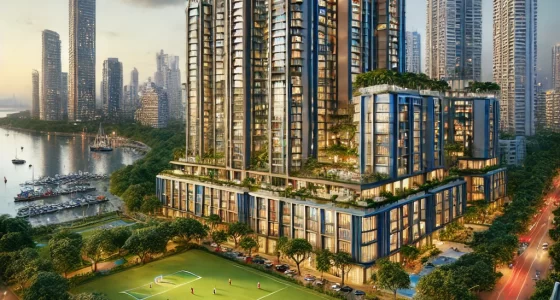The real estate market in the Delhi-NCR region has reached new heights in 2024, setting unprecedented records in both transaction volumes and the number of new project launches. This surge in activity underscores the region’s robust recovery and growing attractiveness as a prime investment destination.
Unprecedented Sales Growth
The Delhi-NCR real estate market has witnessed record-breaking sales figures this year. According to recent reports, the residential sector in the region has achieved its highest-ever sales volume, surpassing previous records. This surge can be attributed to several factors, including a strong economic recovery, improved consumer confidence, and a resurgence in demand for residential properties post-pandemic. The total residential sales value in the region has significantly increased, reflecting the market’s robust performance.
New Project Launches
In addition to soaring sales, the Delhi-NCR region has seen a remarkable increase in new project launches. Developers have introduced a substantial number of new residential projects across various segments, including affordable housing, mid-range, and luxury segments. This influx of new projects is driven by the growing demand for housing and the favorable market conditions. The introduction of new projects is also a response to the increasing need for diversified housing options in the region.
Key Drivers of Growth
Several key factors have contributed to the Delhi-NCR real estate market’s remarkable performance in 2024:
- Economic Recovery: The region’s economic rebound post-COVID-19 has fueled both consumer and investor confidence, leading to increased real estate activity.
- Government Initiatives: Supportive government policies and incentives, including reduced interest rates and tax benefits, have further stimulated the market.
- Infrastructure Development: Ongoing and planned infrastructure projects, such as new metro lines, road expansions, and connectivity improvements, have enhanced the region’s appeal and accessibility.
- Increased Affordability: The introduction of affordable housing schemes and more accessible financing options has broadened the market’s reach, attracting a larger pool of buyers.
- Urbanization Trends: The growing trend of urbanization and the migration of people to metropolitan areas for better opportunities have bolstered demand for residential properties in Delhi-NCR.
Market Outlook
The outlook for the Delhi-NCR real estate market remains positive, with expectations of continued growth in the coming months. The combination of strong sales performance, a robust pipeline of new projects, and favorable economic conditions positions the region as a key player in India’s real estate sector. Industry experts anticipate that the momentum observed in 2024 will sustain, driven by ongoing demand and infrastructural advancements.
Conclusion
The Delhi-NCR real estate market’s record-breaking performance in 2024 highlights its resilience and growth potential. As the region continues to expand and evolve, it remains a focal point for investors, developers, and homebuyers, shaping the future of India’s residential real estate landscape.
Also Read: Mumbai, Delhi NCR, and Bengaluru: Prime cities for Small and Medium (SM) REIT investment prospects









